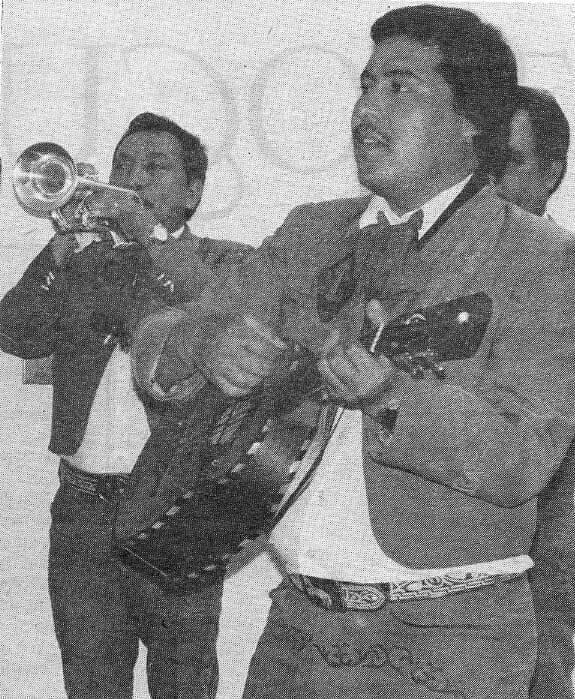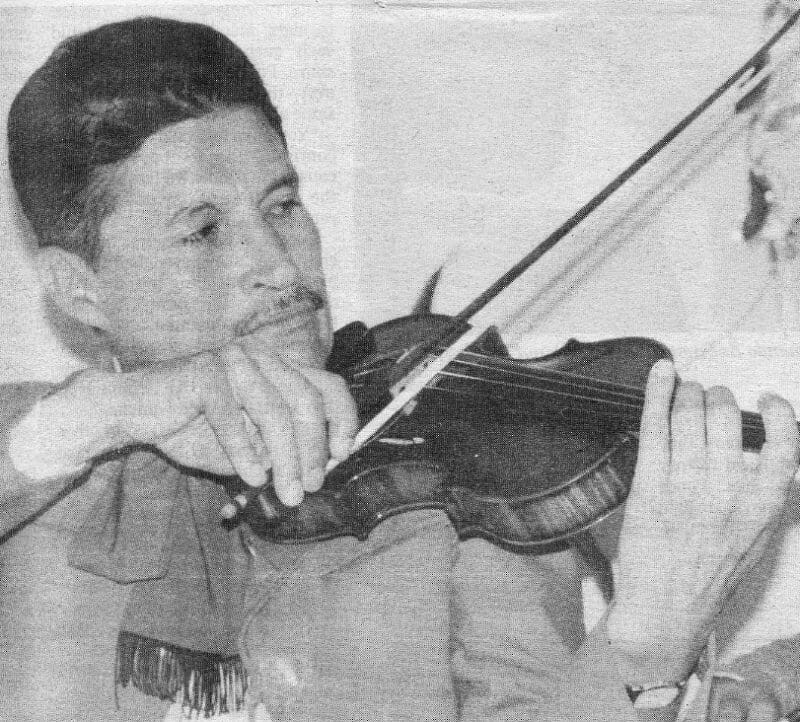AS A MARIACHI melody bounces back and forth inside a circle of trumpets, guitars and violins, baby Fernando Torres’ upturned eyes swing about as if he were watching a tennis match.
Fernando reaches up to his dad, Abigail, a violinist, as he and other members of Mariachi Internacional practice in the living room of lead vocalist and guitarist Francisco Ponce’s San Jose home. Their mighty lungs fill the room with the choruses of “Ojos Españoles,” “Las Perlitas” and “El Son de la Negra.”
During a break, violinist Alfred Madrigal pretends to pull hairs from the little one’s head, making a plucking sound on his violin as trumpeter Fernando Buenrostro Torres looks on. Abigail Torres puts a suction-cup toy on his instrument to amuse the infant, who later grasps his dad’s violin in his right hand and the bow in his left.
Abigail Torres says that he pulls his bow across his violin in the mariachi to benefit children like Fernando, first-generation kids of Mexican immigrants.
“We’re trying to make a little Mexico here,” Torres says in Spanish with a winning smile. “Perhaps, in them, we can leave a little plant, a little seed, that will give birth to the desire to continue this tradition so that it will not end – although I don’t think it will end, because it is and will always be El Mariachi.”
The group’s members – who will perform Sunday in Guadalupe River Park as part of the third annual San José International Mariachi Festival and Conference – often speak of their orgullo, or pride, in playing with Mariachi Internacional. They’re flattered by the warm reception they’ve received from the public in their nine years as a group, performing at festivals, parties, weddings and quinceañeras, the traditional 15th-birthday celebration for girls.
“When the crowd is paying attention, and they clap and yell, ‘Otra, otra’ [encore, encore], I get goose bumps all over my body,” Ponce says.
THE GROUP’S MEMBERS all hail from little towns in the Mexican state of Jalisco. Ponce and trumpeter Genaro Angel Curiel come from Huachinango, a musically fertile town of about 6,000 that has also borne three members of Mariachi Vargas de Tecalitlán, the world’s premier mariachi orchestra.

Mariachi Men: Fernando Buenrostro Torres (left) and José Paz Alvarez.
Ancestral blood tinged with a love for music has helped shape the paths of Mariachi Internacional’s musicians. Violinist Guillermo Garcia, who has played for 20 years, says his grandfather and father were musicians, and he notes with pride that his dad still plays harp in Jalisco. Abigail Torres, who has played for seven years, is taking after his father and uncles.
“They instilled the music into me,” he says at Ponce’s kitchen table as Fernando gurgles in tune to the videotape of the first Mariachi Festival playing in the living room. “It’s a very important part of my life. Sometimes you think you cannot continue with the music and want to get out of it, but you always return because it’s a part of yourself.”
Members of Mariachi Internacional say they know thousands of songs from Mexico, from the popular classic “La Negra” to songs by legends such as Vicente Fernandez, Javier Solís, Pedro Infante and José Alfredo Jimenez. Among the older and younger members, they can recreate the musical history of Mexico, Garcia says. Ponce adds that they try to stay up to date with new songs and listen to recordings of themselves to improve.
At Ponce’s home, the performers banter with each other like life-long friends.
“I consider them like brothers, because the great part of the time – the afternoon, the evening – we spend together,” Torres says. “Since we spend so much time together, we have to get along and help each other, despite differences that may come up.”
While the others laugh chummily, four-year member Garcia says, “I like them, but I don’t know if they like me.”
They acknowledge that performing with the mariachi can be a beautiful but difficult experience. The faltering economy has affected more than high-tech companies; because there is less work for musicians, Ponce explains, the group recently downsized from ten to eight members so they could each garner a larger financial share. Ponce reassures fans, however, that the group sounds the same as it did before the change.
“You have to sacrifice in order to continue ahead – above all, because this is how we live and earn the bread every day and pay the rent,” says Curiel.
But the musicians agree that the challenges are outweighed by the pleasure of stepping into the traje de charro, the fancy Mexican horseman’s costume. “We feel proud in the charro suit,” says guitarist José Paz Alvarez. “The public wants to see that as much as they want to hear the music.”
TORRES CHIMES in that they try to look their best because they often play at functions where the guests are very nattily dressed, and group members want to make their host look good. Ponce adds that some prospective clients have called to ensure that all the members dress the same, because other so-called mariachis they had hired turned out to be just two or three guitarists in street clothes.
Such impostors, Ponce believes, lower the reputation of the art: “Mariachi is not two or three guys with guitars.”
Although Ponce’s windows are outfitted with double glass, his neighbors sometimes catch strains of trumpets and violins floating through the air. But he says they enjoy it. During a birthday performance in his back yard, the neighbors – who are not Latino – peeked over the fence and listened with pleasure. “It makes us happy to hear and see that they like it,” he says.
Group members hope to take their music nationwide to towns that don’t have mariachis, both for the Latinos who live there and the residents who are not familiar with mariachi.
But already, as more cities offer mariachi classes for children, the love for mariachi is infecting both Latino and non-Latino kids around the U.S., Ponce says. He adds that the rollicking oompah-oompah sounds of banda music currently sweeping the land will eventually fade out.
“Banda is nothing more than a fad,” he asserts. “Mariachi has existed, exists and will continue to exist, and will never fall from its level in Mexican music.”


